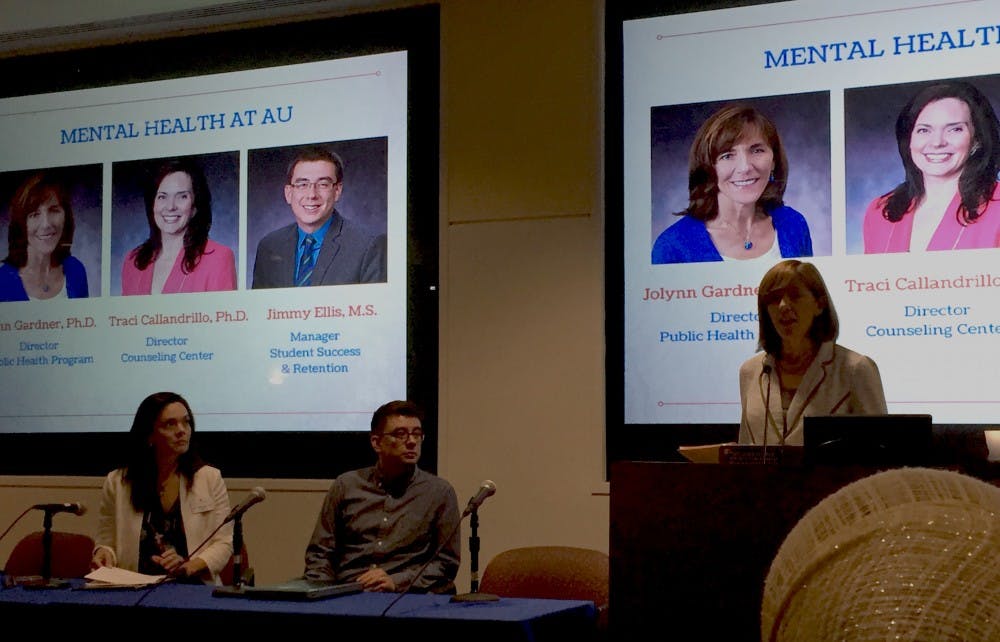The Student Honors Board held its Symposium on Mental Health as a Social Justice Issue this Saturday in the Ward Circle Building.
Several speakers gave presentations including Leah Harris, a trauma survivor and advocate for mental health issues with Trauma Informed DC Initiative, Richard Bebout, the president and CEO of mental trauma care organization Green Door and Kelly Davis, a recent AU graduate and current Policy and Programming Associate at Mental Health America.
Their discussions revolved around the stigmatization of mental illness as it relates to violence, homelessness, racism and incarceration, emphasizing that attitudes toward the mentally ill need to be changed.
“Because of the stigma, we see people who are in trouble, but we don’t know how to help them,” Bebout said.
Bebout also discussed the five signs of mental illness which include not feeling like yourself, feeling agitated and withdrawn, being unable to care for yourself and feeling hopeless.
In addition to the speakers, two panels were held to discuss mental health at AU and mental health in low income and minority communities.
The discussion about AU featured Jolynn Gardner, the director of the Public Health program at AU, Jimmy Ellis, the manager of Student Success & Retention, and Traci Callandrillo, the director of the Counseling Center.
“At AU, stress is rewarded among peers. It’s like a business. If we were in New York, it would be money, or if we were in Los Angeles, it would be fashion. But in D.C., people focus on stress and passion,” Ellis said. “As student leaders, are you rewarding students that are always busy or students that are taking time for themselves?”
Students in the audience asked what the Counseling Center was doing in response to the overwhelming volume of students that request services, as well as the Faculty Senate’s recent resolution endorsing free speech for professors in opposition of trigger warnings.
“It’s not my place to comment on a political issue, and in the Counseling Center we’re focusing on providing the best service we can to students,” Callandrillo said. “Whether I would agree with trigger warnings in syllabi is a different conversation, part of a larger national conversation.”
Callandrillo and Gardner encouraged students to use their own voice to address the Faculty Senate’s decision. However, some students in attendance, such as School of Public Affairs junior Roquel Crutcher, did not agree with their response.
“I was disappointed at the beginning of the day due to the response of the Counseling Center to the conversation about trigger warnings and their slow response to student needs,” Crutcher said. “The panel seemed to go on the defensive, and I just had to leave the room and take a mental break. They’re telling students to talk to their professors about the issues we have, and we are, but they just don’t seem to be listening.”
The second panel included Taylar Nuevelle, a mental health advocate for those within the justice system, Lindsey McDaniel, an AU graduate and social worker from Baltimore who observed the effects of this summer’s Freddie Gray riots on her clients, and Bebout.
This discussion led into a workshop on microaggressions and the experiences of students of color at AU, a predominantly white institution. Ashley Jarvis, a senior involved with Active Minds, and Tatiana Laing, a senior and co-founder of the Darkening, led the workshop.
The pair defined microaggressions as, “behaviors or statements that do not necessarily reflect malicious intent but which nevertheless can inflict insult or injury,” but provided additional explanation with a Buzzfeed video.
“For every workshop I’ve done, if you’re ignorant, you’ll come out of it with something new, and if you know something about it, it’s always good to continue to talk about it,” Laing said. “We only had 35 minutes for this today, which is short, but we thought it was a good workshop to include to bring the conversation back to AU.”
The event was co-sponsored by the Student Honors Board, Student Government, the AU Public Health Association and the Health Studies Department in the College of Arts and Sciences.
Matt Waskiewicz, a senior and president of the Student Honors Board, said he was pleased with how the event went, despite a low turn out.
“I think everyone who came to the event got something out of it,” Waskiewicz said. “We got to see mental health from multiple angles, and we heard from people on and off campus.”
Going forward, the Student Honors Board hopes to continue to engage with different groups on campus and continue working on this cause.
“This event was really a call to action on campus and off campus in D.C. as well,” Waskiewicz said.





